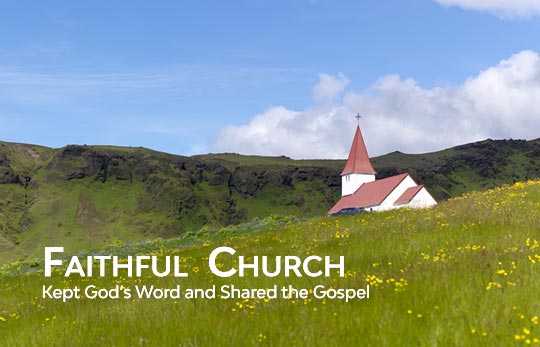
Just before Jesus ascended back to heaven, we are told that Jesus commanded His disciples to preach the gospel of Jesus Christ to every nation. The gospel of Luke gives us more information about Jesus’ final words to the disciples than Matthew. Therefore, I would like to read what Luke wrote,
Then He opened their minds to understand the Scriptures, and He said to them, “Thus it is written, that the Christ would suffer and rise again from the dead the third day, and that repentance for forgiveness of sins would be proclaimed in His name to all the nations, beginning from Jerusalem. You are witnesses of these things. And behold, I am sending forth the promise of My Father upon you; but you are to stay in the city until you are clothed with power from on high. And He led them out as far as Bethany, and He lifted up His hands and blessed them. While He was blessing them, He parted from them and was carried up into heaven.” Luke 24:45-51 (NASB)
This is a beautiful passage of Scripture. Jesus opened the understanding of the disciples to some Old Testament prophecies about Himself to help them understand that He had to suffer, die for our sins, and then be resurrected on the third day for the forgiveness of our sins, which makes believers as righteous as Christ (2 Corinthians 5:21). That is the gospel in a nutshell (1 Corinthians 15:1-8). They were commanded to spread the gospel to every nation. After they arrived in Bethany, Jesus ascended into heaven. Acts 1:9-11 adds that He disappeared into a cloud. Then two angels appeared and told them Jesus would return in the same way. So Jesus and the angels reveal that the apostles were to continue preaching the gospel and making disciples until the second coming of Christ. At that time, Christ will set up His 1,000 year kingdom here on earth and rule as king.
Then the twelve apostles waited until the Day of Pentecost. On that day they were empowered by the Holy Spirit and Peter preached an incredible gospel message to a crowd who already knew what had happened to Jesus. After Peter finished preaching the gospel, Acts 2:41 says three thousand men believed in, repented and followed Christ. Shortly after that, five thousand more men became Christians according to Acts 4:4. Then Acts 7 says that Stephen was stoned to death because he had preached the gospel (Acts 7:60). Acts 8:1-4 says that as Christians fled from Jerusalem to other cities, they were sharing the gospel. Since then believers have continued preaching the gospel as we wait for Jesus’ return.
The reason I started with Jesus’ command to share the gospel is that our study is about the historic church in the ancient city of Philadelphia. The believers in that church were sharing the gospel. As a result, they were being persecuted. We will also learn they shared the gospel as they looked forward to the second coming of Christ. Our study is in Revelation 3:7-13. The passage can be outlined as: The Speaker (v. 7), The Praise (v. 8), The Problem (v. 9) and The Promises (v. 10-13).
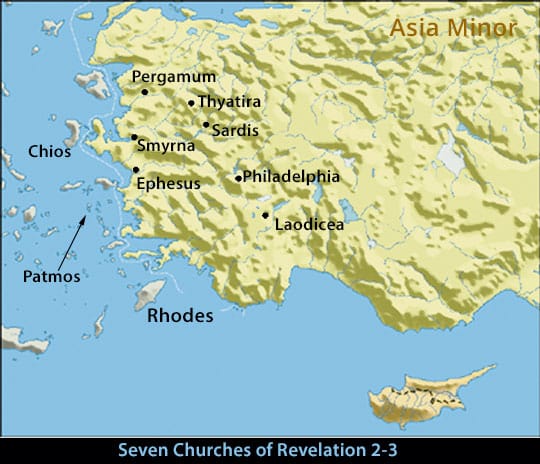
The Speaker
The message starts with the speaker introducing Himself, which was typical for messages sent in the ancient world at about the time the New Testament was written. Today, we look at the end of a letter to see who wrote it, or in emails we look at the header. This message is like an email because the first verse tells us that the message was from Jesus, through the apostle John. The message says,
And to the angel of the church in Philadelphia write: He who is holy, who is true, who has the key of David, who opens and no one will shut, and who shuts and no one opens, says this . . . Revelation 3:7 (NASB)
This message is like the previous messages, in that it was sent to the angel or the pastor of the church, who would then have read it to the church.
City of Philadelphia
We are also told this message was sent to the church in the ancient city of Philadelphia in Asia Minor. This city was about twenty-seven miles southeast of Sardis and about one hundred miles east of Ephesus. It was sprawled across the slopes of three or four hills at the base of Mount Tmolus.[1] We are told the Roman imperial post road ran down the Hermus Valley from Pergamum to Sardis to Philadelphia. The city was named Philadelphia in 189 B.C. by Eumenes II, because his brother loved him. The name means “brother love.” The city was a missionary outpost for the purpose of spreading the Greek culture into Asia Minor, and it successfully accomplished that purpose.
Historical records tell us that Philadelphia was one of the cities in which the medieval Crusades were fought. This church continued to exist until the thirteenth century, and I believe the reason is given in this message. But today the ancient city is in ruins and almost nothing has been excavated. Visitors can see the almost non-existent ruins of the acropolis. A fragment from an arch of the Acropolis is impressive due to its exquisite detail. The only significant ruins in the ancient city are some excavations of the theater ruins.
Identification of the Speaker
Next, we are told the speaker is holy and true. This clearly describes Jesus since Romans 3:23 tells us that everyone else has sinned and come short of the glory of God. When the church was told that the speaker is the One “who opens and no one will shut, and who shuts and no one opens,” the believers would have remembered Isaiah 22:22 which refers to a person who controlled who was allowed to enter into the king’s presence. The point here is that Jesus was saying He will control who enters His future 1,000 year kingdom here on earth.
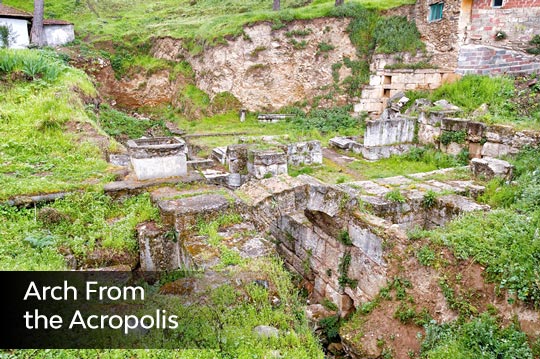
The Praise
In verse 8 Jesus praises this church when He says,
I know your deeds. Behold, I have put before you an open door which no one can shut . . . Revelation 3:8a (NASB)
God Opened A Door For The Gospel
Once again, just as Jesus did with the other churches, He tells the church that He knows all about them. He also says, “I have put before you an open door which no one can shut.” Now the question is, “What is the open door?” The answer is that it refers to an opportunity to share the gospel of Jesus Christ. For example, in 1 Corinthians 16:8-9 we are told God gave Paul an open door to share the gospel in Ephesus. Paul says,
But I will remain in Ephesus until Pentecost; for a wide door for effective service has opened to me, and there are many adversaries. 1 Corinthians 16:8-9 (NASB)
In 2 Corinthians 2:12, Paul again refers to an open door for the gospel of Christ in Macedonia. In Colossians 4:3-4, Paul asks the believers in Colossae to pray that God would open the door for the gospel.
. . . praying at the same time for us as well, that God will open up to us a door for the word, so that we may speak forth the mystery of Christ, for which I have also been imprisoned; that I may make it clear in the way I ought to speak. Colossians 4:3-4 (NASB)
Maybe the most amazing passage about an open door for the gospel is Acts 16:6-9. It says,
They passed through the Phrygian and Galatian region, having been forbidden by the Holy Spirit to speak the word in Asia; and after they came to Mysia, they were trying to go into Bithynia, and the Spirit of Jesus did not permit them; and passing by Mysia, they came down to Troas. A vision appeared to Paul in the night: a man of Macedonia was standing and appealing to him, and saying, “Come over to Macedonia and help us.” Acts 16:6-9 (NASB)
These are incredible verses because they reveal that God controls where and when the gospel is preached. God has been and is directing traffic. Now why does He do that? The first reason is that God knows who the Holy Spirit has prepared to hear the gospel (John 6:37, 44, 65). A good example is when the Holy Spirit sent Philip to meet the Ethiopian eunuch in Acts 8. That resulted in the eunuch becoming a believer in Jesus Christ (Acts 8:35-37). Another example is the Gentile named Cornelius in Acts 10. God sent Peter in Acts 10:17-33 to speak to Cornelius. As a result, he and his family responded to the gospel in Acts 10:44-48.
A second reason God directs where and when the gospel is preached is that He knows where He wants to start preparing people to believe in Jesus. Paul calls it planting and watering in 1 Corinthians 3:6-9. Yet at the same time, God commands us to preach the gospel and He urges us to pray for people to share the gospel (Matthew 9:37-38). Now I do not know how all of this works together, but I am confident that God completely understands. But what is clear is that Jesus has called you and me to plant and water. That is called obedience. Then we trust God to cause the increase. The church in Philadelphia was being faithful. God gave them an open door and they were planting and watering.
May I ask, “Are you sharing the gospel?” I have asked God to give me opportunities to share the gospel and God has given me occasions to plant and water. Currently, God has given us a major chance to share the gospel through NeverThirsty.org. Right now, He has given us a wide open door. I know one man in our congregation who recently shared the gospel with his family. We had prayed for God to give him an open door to share Jesus to his family and God opened a door. A few days ago, a woman shared that as she was walking by a man, she had the strong feeling that God wanted her to share the gospel with him. So, she did and afterward she was surprised. The man told her that he knew why she had the strong feeling that God wanted her to speak to him. He explained that another woman had shared the gospel about Jesus with him earlier and he had questions about becoming a Christian. Then she knew that God had moved her to talk with him about Jesus. It was not only an assurance that God exists, but that God opens and closes doors. Eventually, that man asked Jesus to forgive his sins and gave His life to the Lord. God is in the business of directing traffic—opening and closing doors. He has asked you and me to plant and water. I trust that you are sharing the gospel with your neighbors, friends, and family. He has called us to plant and water. He gives the increase! So, this gives us our first important principle, believers should ask God to give them opportunities to share the gospel.
Now that we have our first principle, I want to make two important points about how to understand Scripture. The first point is that the meaning of this passage is not that we should ask God to give us opportunities to preach the gospel. The meaning of the first part of verse 8 is that God opened the door for the gospel to be shared by the believers in this church in the city of ancient Philadelphia. The second point is that our first principle is an application that we can learn from the meaning of this verse. There is usually more than one application from a verse. I have a responsibility to explain the meaning and to provide one or more applications. On one occasion a man asked me, “How many meanings are there to every verse?” I told him there is only one meaning, but many applications. Principle #1 is an application.
Believers in Philadelphia Boldly Shared The Gospel
The last part of this verse has a different meaning and a different application. Now we are told why Jesus had opened the door for evangelism . . .
. . . because you have a little power, and have kept My word, and have not denied My name. Revelation 3:8b (NASB)
The phrase “You have little power” seems to refer to the size of the congregation. Apparently there were very few people in this church. The church was not impressive. The next verse will reveal that they were being persecuted. This small congregation shared the gospel, kept Jesus’ word, and did not deny Christ while enduring persecution. Now that is an outstanding church. This was a very, very faithful church. It faithfully shared Jesus. They loved Jesus with all their heart, soul, mind, and with muchness. They knew Scripture and obeyed it. One would not have expected this small church to be praised by Jesus, but it was. This church and Smyrna are the two outstanding churches among the seven churches in Revelation 2-3. You see, when persecution breaks out against churches, real believers become serious about their faith. Are you serious about the things of God?
Believers in Philadelphia Were Not Secret Christians
There are several more important applications that jump out from this verse. The next application is that the believers in Philadelphia were not secret Christians. John 19:38 tells us that Joseph of Arimathea was a secret Christian. He was afraid to let people know that he was a Christian. He wanted to be safe. May I ask, “Do you want to play it safe? Are you a secret Christian?” You may have a relationship with a non-Christian and you are afraid to share Jesus because you might lose the relationship. I think that it is a problem some Christians have because I have had those thoughts also. Recently, I wrote an article titled, “Is It Possible That God Is Hiding?” I made a risky decision to share it with my barber. I could have offended the man and lost a great barber. But I am more concerned about his soul and his eternity. The article says that we cannot find God because He is hiding from us. He does it for our safety. If we saw Him, we would die before we could respond to the gospel. I was surprised that he listened and interacted with me. I was either planting or watering. Do your neighbors know you are a Christian? Have you ever invited them to your home with the goal of sharing the gospel with them? How about someone at work? Have you ever invited them to have lunch and then looked for an opportunity to share the gospel? That would be an act of faithfulness. Sharing the gospel pleases Jesus!
Acts 4:29-30 tells us that when the early Christians were threatened by the Sanhedrin Council to stop preaching Christ, they just prayed for boldness. What did the Holy Spirit do? He gave them boldness to preach the Word of God. Rather than submit, they responded with boldness and refused to stop! My dentist preaches Christ to all of his patients and God has given him a very successful business. The believers in Philadelphia responded with boldness and preached the gospel. Think about this. If God opens the door for you to share the gospel and you are afraid to walk through the door, then you have missed a great, divinely given opportunity. But if you ask God for boldness and share the gospel, then you will be faithful. If someone believes in Jesus, you will be thrilled. It will motivate you to want to share Jesus again. God calls us to be faithful and to plant and water. He gives the increase! So, this gives us our second principle: faithful believers will boldly share the gospel.
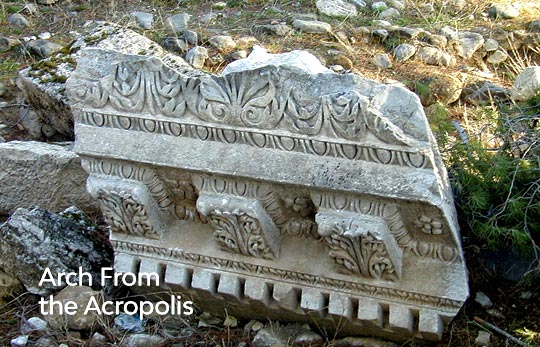
The Problem
Verse 9 introduces us to the problem this church was experiencing. It is the same problem the church in Smyrna was experiencing in Revelation 3:9. The verse says,
Behold, I will cause those of the synagogue of Satan, who say that they are Jews and are not, but lie — I will make them come and bow down at your feet and make them know that I have loved you. Revelation 3:9 (NASB)
The problem was that some Jews from the local synagogue were persecuting believers in the church. When Jesus said that they were not Jews, He did not mean they were not Jews by race and religion, but that they were not spiritual Jews, because they had rejected Jesus as their Messiah. These Jews thought they were pleasing God by persecuting the Christians. In Philippians 3:1-6, Paul said that he thought he was serving God by persecuting Christians. Paul called unbelieving Jews “the false circumcision” in Philippians 3:2. Their hearts were not circumcised by the Holy Spirit. They were not spiritual Jews. So Jesus said they will know eventually that I have loved you. That is, they will know that Jehovah loves them and that they were wrong! This is great! God had opened the door for this church to share the gospel. They knew Scripture, and they kept it while continuing to be persecuted. This was a very faithful church.
The Promises
Verse 10 explains the first promise.
Because you have kept the word of My perseverance, I also will keep you from the hour of testing, that hour which is about to come upon the whole world, to test those who dwell on the earth. Revelation 3:10 (NASB)
The opening part of this verse is not a good translation of the Greek text. It is better translated as “Because you have kept My command to bear up under difficult circumstances.” The idea is that these believers obeyed Jesus’ command to preach the gospel while patiently enduring persecution. That is, “they hung in there!” They did not give up. They did not quit. They kept preaching Jesus! This church was faithful even in the midst of persecution. Then Jesus promised that He would keep them “from the hour of testing.” The Greek word for “hour” can refer to one hour or a short period of time. Here the context helps us understand the word “hour” just refers to a short period of testing or persecution. Jesus also said the period of testing would be worldwide or over the whole earth. This helps us understand that Jesus was not referring to some local persecution or a series of persecutions by the Roman Empire. Jesus was referring to the future tribulation period. This is a promise that Jesus would keep this church from the Great Tribulation period and the promise extends to us today. Apparently, someone was teaching that they were already in or were about to enter the Great Tribulation. So, Jesus promised that they were not in the tribulation and they were not going to experience it.
This is an important verse because it teaches us that the body of Christ or the church universal will be raptured before the Great Tribulation. The Greek phrase for “keep from” is tereo ek, and it actually means “to keep from.” That is, the church would be kept from the Great Tribulation, and so will believers today. If you recall the future timeline, the rapture will occur before the Great Tribulation. Also, the tribulation occurs before the Second Coming of Christ. At the end of the tribulation, Christ’s return occurs during the battle of Armageddon. Then the millennial kingdom or 1,000 year kingdom occurs. So, Jesus promises believers that we will be raptured or “kept from” the Great Tribulation.
Now remember Jesus said that He had the key of David in verse 7? So now we have all the piece parts. Jesus was saying that He will control who goes into the kingdom. At the beginning of the kingdom, He will only allow Christians into the kingdom (Matthew 25:31-46). This is a great message.
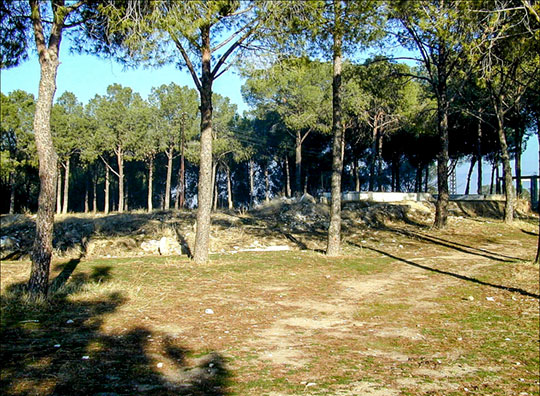
I Am Coming Quickly
Next, Jesus said that He was coming quickly.
I am coming quickly; hold fast what you have, so that no one will take your crown. Revelation 3:11 (NASB)
The Greek word for “quickly” just means that when Jesus comes, He will come suddenly; He was not saying that He would come immediately—today, tomorrow or next month. When He comes, His coming will be a surprise. So, hold on!
More Rewards
Then Jesus ends the message with promises of several rewards.
He who overcomes, I will make him a pillar in the temple of My God, and he will not go out from it anymore; and I will write on him the name of My God, and the name of the city of My God, the new Jerusalem, which comes down out of heaven from My God, and My new name. He who has an ear, let him hear what the Spirit says to the churches. Revelation 3:12-13 (NASB)
Once again, overcomer refers to believers (1 John 5:5). Jesus is saying that because of faithfulness, every believer will become a pillar in the temple of My God (Revelation 21:22) and God’s name, the name of Jerusalem and My new name (Revelation 2:17) will be written on him or her. In the ancient world, when someone purchased and donated a column for the temple, his name was written on the column in recognition of his donation. So, Jesus said He will own us, as if we were a column in the temple and all these names will be written on us. This is another promise of eternal security. This has been the pattern in every promise to every church so far. He promises that our salvation is secure, even in the midst of persecution. That helped them and us to endure persecution. This gives us our third principle: believers are victors even in the midst of persecution. The key word is victors.
Conclusion
This reminds me of the parable of the Ten Minas in Luke 19:11-27. In that parable Jesus describes a nobleman who takes a trip to a distant country to receive a kingdom. Before he left on his trip, he gave each of his ten slaves one mina to invest. When he returned, he called the ten slaves and asked them to report what they had earned. The first slave had invested his one mina and had earned ten minas. The second slave had earned five minas. The next slave reported that he had not earned anything. He had just buried his mina until the master returned. The nobleman called this last slave a worthless slave. He had done nothing! Then the nobleman ordered that his mina be taken away. The application from the parable is found in verse 26. It applies to those who are true and false believers.
. . . to everyone who has, more shall be given, but from the one who does not have, even what he does have shall be taken away. Luke 19:26 (NASB)
That is, true believers will be faithful and will be rewarded with more opportunities for service, but false believers will have everything taken away. They will go to hell. You see, believers will be faithful. There is another application, but I will stop here. Now someone might think that if they do not share the gospel they will go to hell. But that is not the meaning of the application. The message is that believers are faithful. If you do not share the gospel, you are disobedient. This church is a wonderful example to us to be faithful by sharing the gospel.
Remember from our study that this church was faithfully 1) obeying His Word, 2) sharing the gospel, and 3) continuing to share the gospel even in the midst of persecution. Faithfulness was the mark of this church and it is the mark of a Christian. The key word is faithful. It is a word we apply to our service, going to church, to giving, and praying for others. But can I ask, “Are you faithful to Jesus in sharing the gospel?” Are you giving money to get out the gospel and personally sharing the gospel yourself? Are you faithfully striving to share the gospel?
I want to close with this promise of a reward from Daniel 12:3.
Those who have insight will shine brightly like the brightness of the expanse of heaven, and those who lead the many to righteousness, like the stars forever and ever. Daniel 12:3 (NASB)
This is a promise that those who lead many to become Christians, will be rewarded. They will shine like the stars in heaven. Jesus is calling you to be faithful in everything that you do for Him, including joining His rescue operation by planting and watering.
References:
1. Jerome H. Smith. The New Treasury of Scripture Knowledge. Thomas Nelson Publishers. p. 1508.
Suggested Links:
Evaluating the Health of Your ChurchEphesus — Serving God Without Your First Love
Smyrna the Persecuted Church — Be Faithful Until Death
Pergamum — Church That Ignored False Teaching and Sin
Thyatira — Church That Tolerated False Teachers and Sin
Sardis — The Dead Church With A Reputation It Is Alive
Laodicea — The Lukewarm Church Is Neither Hot Nor Cold